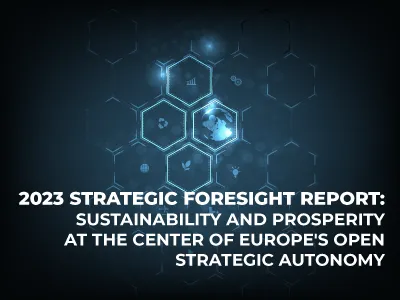
The European Commission presented its Strategic Foresight Report 2023, which analyzes how to put Sustainability and Prosperity at the 'Center of Europe's Clear Strategic Autonomy' and proposes ten concrete actions to achieve this goal.
According to this report, the European Union (EU) is making a deep and ambitious transition plan to achieve climate neutrality and sustainability in the next decade. This sustainability transition is crucial to strengthen the EU's Open Strategic Autonomy, ensure its long-term competitiveness, maintain the social market economy model and consolidate its global leadership in the new net zero economy. To be successful, therefore, the EU must address a variety of challenges, and make choices that will impact societies and economies at an unprecedented speed and scale.
That's why, in its 2023 report, the European Commission offers an overview of the challenges faced and recommends ten areas of action to ensure a successful transition. Politicians also suggest adjusting the Gross Domestic Product (GDP) to take into account different factors such as health and the environment, with economic approaches that take into account welfare. This approach supports the EU's Open Strategic Autonomy and global stance in its pursuit of a resilient net zero economy.
Overcoming key social and economic challenges
In the transition to a sustainability plan that covers both economic and social sustainability, the EU faces a number of challenges. These main difficulties are;
• To shape public opinion and how governments around the world act by challenging international cooperation on global issues such as evolving geopolitical shifts, climate change or the energy transition.
• To meet the need for a new economic model that focuses on the well-being of people and nature, separates economic growth from resource use, and shifts to more sustainable production and consumption.
• To meet the growing demand for adequate skills for a sustainable future. The availability of employees equipped with the appropriate technical and social skills will be crucial to the EU's competitiveness. That's because 85% of EU firms lack staff with the necessary competencies to navigate the ecological and digital transitions.
• Sustainable transition requires unprecedented investments. To achieve this, it is necessary to secure adequate financing from both the public and private sectors.
Ten areas to take action
There are ten articles in response to policies that care about staying focused on human and community welfare for the transition to the field of sustainability. These:
1. To achieve a new European social contract through renewed welfare policies and a focus on high-quality social services.
2. Deepen understanding of the single market to advocate for a resilient net zero economy by focusing on Open Strategic Autonomy and economic security.
3. Increase the EU's offer on the global stage to strengthen cooperation with key partners.
4. Support the transition towards sustainability in production and consumption by targeting regulation and promoting balanced lifestyles.
5. Move towards a “Europe of investments” through public action to catalyze financial flows for transitions.
6. Align public budgets for sustainability through an effective tax framework and public spending.
7. Shifting policy and economic indicators further towards sustainable and inclusive prosperity, including by adjusting GDP for different factors.
8. Ensure that all Europeans can contribute to the transition by increasing labor market participation and focusing on future skills.
9. Strengthening democracy with intergenerational justice at the center of policy-making to strengthen support for transitions.
10. Complementing civil protection with 'civilian prevention' by strengthening the EU's preparedness and response toolbox.
Next steps
The 2023 Foresight Report was presented to EU member states at the General Affairs Council on 10 July. Along with the foresight work carried out by the Spanish Presidency of the European Council, the commission report is also expected to be discussed at the informal European Council leaders' meeting to be held in Granada in October 2023.
In November 2023, the commission is scheduled to jointly organize the annual European Strategy and Political Analysis System (ESPAS) conference with the European Parliament. This would be a good opportunity to test, discuss and think ahead the key findings of the 2024 report on inter-agency global trends, prepared jointly by the EU institutions.
 Back
Back







